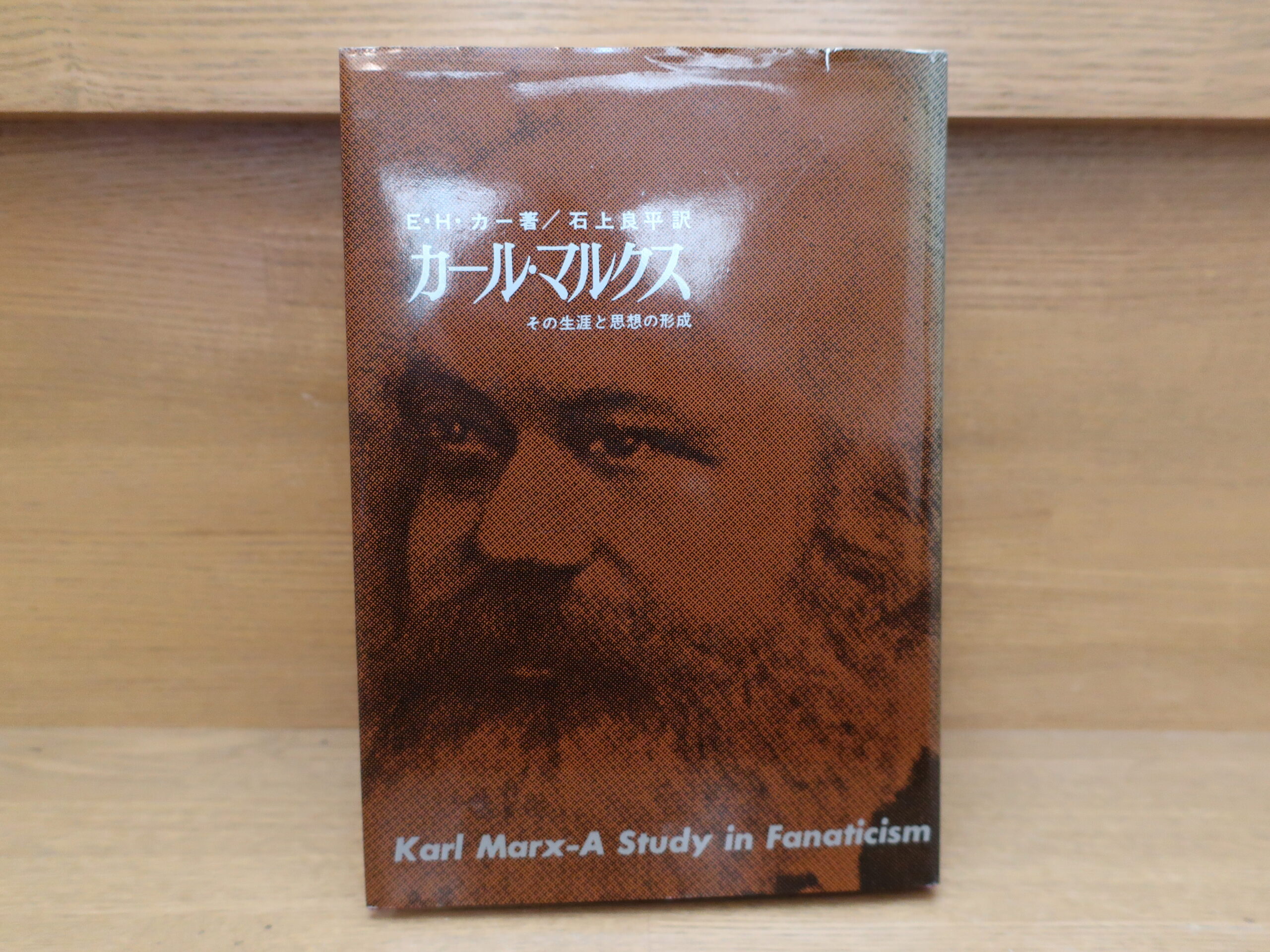Table of Contents
Historian E. H. Carr's Views on Marxism - Why Marxism Attracts People
E. H. Carr, a noted British historian, published in 1934Karl Marx: His Life and the Formation of His Thought.A detailed look into Marxism in the
This article cannot present the full text, but will present some of it.
E. H. Carr, in this biography, has written about Marx'sCapitalism.We will point out the problems in the "Marxian" theory of surplus value. We will then address contradictions in the famous "surplus value theory" and "labor value," and analyze why Marx is believed by so many people despite these problems.
Let's take a quick look at the section.
The labor theory of value is a doctrine, a demand
It (labor theory) can be believed as a kind of faith, but it cannot be proven or denied by logic. It may have moral or philosophical significance, but it has no validity in the realm of economics, true or false.
But that is not to say, however, that the labor theory of value is not vitally important in the system of Marxism or that Marx cannot be given the status of a great thinker.
The Catholic Church has founded its system on a few imperatives that can be debunked by human experience but believed by faith. On the basis of these demands, Tertullian (I believe not because it is impossible(who was the first to say that) to St. Thomas Aquinas, a series of great thinkers established a system of complete logical coherence.
The first step is full of flaws that faith turns away from, but the other steps are logically flawless. Psychologically, this incongruous juxtaposition of faith and logic has been shown to be well suited to the needs of the majority of humanity.
Marx, who was a praiseworthy practical psychologist, used this same technique without being aware of it.
His first step - the theory of the value of labor - needs to be accepted by his followers as a doctrine, a demand. Once this first step has been accepted, Marx then, through a series of arguments fashioned from his brilliant mind, produces a system that has won the allegiance of millions of disciples (with the same parallelism of faith and logic that has made the Catholic Church the most powerful institution in the world).
Miraisha, E. H. Carr, Karl Marx: His Life and the Formation of His Thought, translated by Ryohei Ishigami, p. 364-5.
Some line breaks have been made.
In order for the Marxian ideology to be established, one must accept the doctrines it presupposes. Even if the doctrines are logically and scientifically false, belief in them will make the doctrines valid. It is as if it were the history of Catholicism," Carr said here.
What is the real strength of Marx's position?
That Marx correctly deduced his conclusion (the surplus value theory) from his premises (the labor value theory), and that he was the first economist to do so, may be to his credit as an original thinker. But if his premises were wrong, this would not contribute to making his conclusions correct. It is now time to transfer the surplus value theory, as well as the labor value theory, to the antique museum of economics.
The real strength of Marx's position lies elsewhere. Neither Marx nor his disciples believed that workers were being exploited because they deduced that fact from the theory of surplus value. They believed that for another reason. And what they found in the surplus-value theory was, in essence, an economic argument to support some existing belief.
Faith is still something that is held, even when the argument falls down. There are many who feel, irrationally but by no means condemnably, that those who actually do the hard labor in the factory have a moral right to the finished product in preference to those who merely provide him with the materials and tools he uses to make it. It is perfectly legitimate to believe that the worker does not get his "fair" share of the product of his labor.
Marx, in numerous eloquent and persuasive chapters, attempts to prove that this is precisely what was true in nineteenth-century England. And the same opinion should be held today - though to a lesser extent now than then, when the evidence in favor of that opinion was overwhelming.
But such things are moral judgments and have nothing to do with the theory of surplus value submitted by Marx as an economic law.
Miraisha, E. H. Carr, translated by Ryohei Ishigami, Karl Marx: His Life and the Formation of His Thought, p 369-370
Some line breaks have been made.
I think it is a very important point to make that "even when arguments fall, faith is still embraced."
It is also hard to miss the point that Marx's argument at the end is not purely theoretical or economic, but moral.
The Core of Marxism" by Carr - Why Marxism Attracts People
Perhaps for the number of people who read it, "Capitalism" had a greater impact on human history than any other book ever written. The title of the book has become a household word. It is in libraries everywhere. There is no serious scholar or thinker who has not consulted its pages. But no one, except for a few specialists and enthusiasts, has ever read it through.
The book's ka was not in its content, but in its very existence. Marx, with genius intuition, saw that the working class would increase tenfold, that it would become an organized mass, assembled by new machine-driven industries, and that it would surely play a dominant role in the history of the next century.
In his "Communist Manifesto," he drew up a platform for the rebellion of the proletariat and their victory over the bourgeoisie, which had confiscated their property.
In "Capitalism," he then proved that this victory was simply "exploitation of the exploiters"-just retribution for decades of exploitation by the bourgeois capitalists at the expense of the workers.
The average worker did not read Capitalism, and if he had, he would not have been able to understand the arguments that prove his point.
But I learned that such an argument was in the book. The labor leaders who read it told them that such proof existed, and they were not inclined to doubt such a welcome assurance.
Thereafter, the worker could feel that he was fighting for justice, not for himself. And if someone asked him how he knew this, he could point to this "working class Bible" that the working class had never read. It was, in the words of one Engels now, "the common political line recognized by millions of workers from Siberia to California. The Theory of Capital was no longer a single argument. It was a protective note.
Perhaps the verdict of posterity will be that Marx was right to frame the capitalists of his day for "deprivation.
But it is a sin based on moral, not economic, considerations. And the economic argument that Marx used to support this charge was both misplaced and absurd.
Capital is a great book precisely because it is not always faithful to its ostensible character as an economic treatise, and because its prophetic tone of righteous indignation interrupts the progress of tasteless economic argument.
No one reads Capitalism because of the mass of economic fallacies that Marx submits under the guise of the labor value theory and the surplus value theory.
Since the economic character of the book is most faithfully preserved in the first few chapters, which are devoted mainly to the details of these theories, would-be readers of Capital are very likely to abandon the task of reading it at the outset. It is regrettable that they are so easily discouraged from reading the book.
The part of Capital that holds its value in Capitalism is a terrific exposé of the horrendous living conditions of the English working class in the middle of the last century, where men, women, and children were making a profit for their employers in return for wages somewhat less than what was sufficient to support their lives.
Wherever the accumulation of facts supersedes argument and moral outrage overtakes economic analysis, Marx rises swiftly to become the prophet of the proletariat, and the "Capital Admonition" once again demands the right to be regarded as a classic.
Some line breaks have been made.
Miraisha, E. H. Carr, translated by Ryohei Ishigami, Karl Marx: His Life and the Formation of His Thought, p 379-381
This quote is the most important point made in the book.
It is hard to find anything that so clearly points out why Marxism has attracted so many people around the world.
Here we examine the reasons for the spread of Marxism, not only in terms of economics, ideology, and ideology, but also from the perspective of its relationship to the world as a whole. It may be said that this is a step backward viewpoint unique to historian E. H. Carr.
This passage is very important in considering the phenomenon of Marx.
The 'Capital' was no longer a single argument. It was a talisman."
The magnitude of what this sentence suggests is immeasurable.
Carr's "Karl Marx: His Life and the Formation of His Thought" offers a more detailed look at these reflections on Marxism. This is only a small part of what is presented here. If you are interested, please pick up a copy of this book.
On the next page we will look at Marx's theory by Tony Judt, another world-renowned authority on history. Please take a look at this page as well, as he makes some very interesting points in considering Marx as a religious phenomenon.
The above is "Historian E. H. Carr's View of Marxism - Why Marxism Attracts People Is Marxism a Religious Phenomenon?
Next Article.
Click here to read the previous article.
Related Articles







































